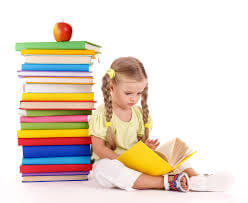Reading
Reading Curriculum at De Bohun

Intent
At De Bohun Primary School, reading is a top priority and is a key driver for our curriculum. Therefore, we have a team, the Language and Communication Team, who work closely together with a member of staff from Early Years, KS1 and KS2 to ensure coverage and progression.
It is our intention to ensure that by the end of their time at De Bohun, all pupils are able to read fluently, and with confidence, in any subject and for any purpose throughout their lives. We therefore intend to encourage all pupils to read widely across both fiction and non-fiction to:
- Develop knowledge of themselves and the world in which they live;
- To establish an appreciation and love of reading;
- To gain knowledge across the curriculum; and
- To develop their comprehension skills
We are committed to providing vocabulary rich reading material across the curriculum.

Implementation
The systematic teaching of phonics has a high priority throughout EYFS and KS1. At De Bohun, we use ‘Read Write Inc’ produced by Ruth Miskin. Our staff teach pupils the relationship between sounds and the written spelling patterns, or graphemes, which represent them. All children in Reception and KS1 (where necessary KS2) have daily phonics sessions in small ability groups where they participate in speaking, listening, spelling and reading activities that are matched to their current needs. The teachers draw upon observations and continuous assessments to ensure pupils are stretched and challenged and to identify children who may need additional support. Timely intervention is planned for those children who are working below expected levels as soon as their needs are identified.
We recognise that systematic, high quality phonics teaching is essential, but additional skills and opportunities are needed for children to achieve the goal of being a well-rounded reader, namely comprehension.
When children have completed the Read, Write, Inc phonics programme, reading is developed during guided reading, using high quality texts and focused skill teaching (see ‘Themed Curriculum Map and ‘whole school reading skills progression’ map). Strong links are made between reading and writing. In KS2, Mondays and Fridays are dedicated to studying the class text, focusing on language, authorial intent, prediction, summary and sequencing. Whereas on Tuesdays, Wednesdays and Thursdays, children read and enjoy high quality fiction and non-fiction texts based around a theme, linking (where possible) to their topics across the curriculum and the wider world. The skills taught during these sessions develop their key reading skills of decoding: Vocabulary, Inference, Prediction, Explanation, Retrieval and Summarising (VIPERS).
All children read aloud daily during phonics or guided reading as part of independent and guided practice. In addition to this, they read at least once more a week with staff on a one-to-one basis during Drop Everything and Read time (DEAR) – the focus being on the lowest 20% and children who are Pupil Premium to read aloud twice a week to a member of staff.
We recognise the importance of developing a rich and extensive bank of vocabulary; therefore, we discreetly teach vocabulary directly linked to the text during every phonics and guided reading session.
All books shared with children are age appropriate but the selected books also offer levels of challenge to develop children’s reading fluency, stamina and understanding of books.
Reading at home is encouraged and promoted through class incentives and parental engagement sessions. Children working on the Read Write Inc. programme take home a ‘book bag book’ matched directly to their current phonics level; they are also encouraged to choose an additional book to share with their family at home. Progressing from this, children work through levelled books matching the child’s current reading ability (Accelerated Reading). The children visit the school’s library where they select two books: one ‘learning to read book’ which is matched to their reading level and one book for pleasure. When they have finished their ‘learning to read book’, they take part in an Accelerated Reader quiz to assess their understanding of the book.
We expect family members at home to read these books with their child daily and make comments in their child’s reading record.

Impact
Through the teaching of systematic phonics, our aim is for children to become fluent and confident word readers by the end of KS1.
As a Year 6 reader, transitioning into secondary school, we aspire that children are fluent, confident and able readers, who can access a range of texts for pleasure and enjoyment, as well as use their reading skills to unlock learning and all areas of the curriculum. We firmly believe that reading is the key to all learning and so the impact of our reading curriculum goes beyond the results of the statutory assessments.

Reading at De Bohun – Overview
Reading Progression of Skills Map
Reading Themed Curriculum Years 3 – 6





